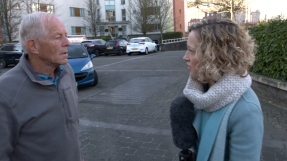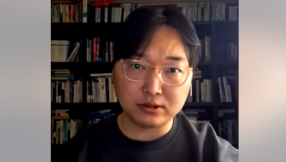Reaching Britain with the mixed economy of church
Bishop Graham: ‘Mixed economy’ is an expression that originates from Archbishop Rowan Williams when he was a Bishop in Wales. The thinking behind it is that new congregations and church plants are not to replace existing churches with their approach, but complement them.
There is much good work to be done by traditional churches and they need to be supplemented and complemented by new forms of church to reach those that remain untouched by existing churches.
It is a partnership between the two and not a competition. The intention is not to replace one another, and neither is it to operate in isolation from one another but rather supplement with mutual prayer, recognition and learning from one another.
The great majority of Fresh Expressions planted in the last five or six years are new congregations of existing churches so it helps lots of local parish churches and Methodist circuits to become mixed economy.
CT: You meet a lot of people in the traditional churches. Do they feel threatened by new expressions or pressured to change at all?
Bishop Graham: It’s a varied picture but I don’t think there is much of that. If there is pressure to change, it’s indirect, because no one is saying stop doing church traditionally and ‘everybody’s got to do these new things’. The other aspect of the mixed economy is an understanding that the whole church is missionary and that traditional churches need to be missionary in their traditional forms.
There is a challenge that way, but I find that more traditional worshippers are grateful that something is being done and I find it even more with the older generation who say that they are worried that their grandchildren don’t go to church at all. So if they see something happening that isn’t church the way they are used to but it’s helping their grandchildren engage with the church, then they are excited about it and not necessarily threatened by it.
CT: The mixed economy means many different styles of church and different traditions and denominations working together. Is there a tension between the inevitable diversity and unity?
Bishop Graham: I had a meeting recently with David Cornick, General Secretary of Churches Together in England and a former colleague of mine. I think we are both clear that unity and mission are equally important and you can’t simply go for one and not the other. But the way it is working out is beginning to change. We had a long period of time when there was considerable hard work about formal unity for the sake of mission and to give a united witness. That’s still very important but what’s tending to happen now is that more progress is being made with unity when churches in an area are acting together or coordinating in mission.
Fresh Expressions is one of the ways they can do that. Doing mission is the best route to unity, many of us are discovering. Diversity is fine as long as there is real communication locally. Some churches have gathered together as a result of the Hope 08 initiatives and have kept working together and a lot of the Street Pastor initiatives have been made possible by that.
We have a regional organisation called FEAST through which the Fresh Expressions strategy team leaders of different denomination in an area coordinate together. It allows them to know what the other is trying to do and that way, you don’t have six churches working on one estate, for example, and no one working on the estate next door.
In lots of parts of the country, rural and urban, we are encouraging churches to plan together and to pray together and, if you like, coordinate the diversity. So it helps with unity rather than undermines.
CT: When we talk about the church today, a word we often hear is decline, but Fresh Expressions seems to be experiencing a lot of growth.
Bishop Graham: Yes it is. It’s hard to know exactly how much but the Methodist Church has fairly robust figures now and there is something like 1,200 Methodist churches that are planting a fresh expression. Now a lot of them will be quite small and inevitably lots of them will be young because this is a young movement but that amounts to a lot of people.
Some of them will be people who had a background in church but stopped going. Others will be people who have never had any real contact with church. But certainly one of the ways the church is growing and evangelising in Britain is through the planting of fresh expressions.
CT: Would you go as far as saying that it is the key to the church’s long term survival?
Bishop Graham: Well, I think it is one of the keys. If we continue with this mixed economy approach where the whole church is realising that it is called to mission, and that there is a place and partnership, and for the traditional and the fresh expression, then we might become quite a different sort of church, much more engaged as a whole with its community and not needing words like ‘traditional’ or ‘fresh expression’.
So I think fresh expressions are one part but it will never be the whole of the future. It really does need this dynamic relationship between the more traditional and the more innovative.
CT: The royal wedding was traditional. Was the Church of England not tempted to go for a fresh expression?!
Bishop Graham: [laughs] Well, I believe the choice was down to the couple and they wanted it like that! But one of the mistakes we can make is just assuming that fresh expressions are for the young and the traditional is for the old.
I have a lot to do with youth ministry, I chair the Soul Survivor Trust, so I know that large numbers of young people like it very contemporary and lively, but others love the chants of Taizé, for example, and something more structured.
You have to remember that this current generation of pensioners includes people like Rod Steward and Mick Jagger. There is a rock ‘n’ roll generation that has reached pension age now. So the mixed economy is for all generations.
CT: You’ve just partnered with 24/7 Prayer. Why’ve you decided to move Fresh Expressions forward with them?
Bishop Graham: They came to us because they were coming to the conclusion that the core values that they had and the core values that we have are very similar. Our core values are about prayer and spirituality, and all our practical training is founded on the principle that you need to discern, you need to pray, you need to listen to God, you need to help him to show you how to engage with your community, your area, your network.
That ties in so well with their prayer houses that get involved with mission, and we are a missionary organisation that is rooted in prayer and discernment. Andy Freeman, who co-wrote Punk Monk, is also training to be a pioneer minister in the Church of England and so came more fully in touch with the work we are doing with Fresh Expressions through his training.
We are absolutely delighted to have them as partners. It will strengthen us in terms of the prayer base involved in local mission strategies and the planting of fresh expressions, and developing patterns of prayer and worship within fresh expressions as they start to grow.
CT: Is a fresh expression something any church could do?
Bishop Graham: More or less, yes. We would like the mixed economy to be the default setting for the church in the UK, so that it becomes the norm for any church both to develop its established patterns as much as it possibly can and at the same time ask: who will we never reach if we only do this? What else could we do? And ask the Holy Spirit to inspire their imagination and show them.
CT: Is there a secret to a successful church plant?
Bishop Graham: There’s an expression in mission we use a lot: see what God is doing and join in. The two key ingredients are, one, that it comes out of prayerful listening to God about the opportunities he is preparing in an area, and, two, that it comes from what the Mission Shaped Church report points to: dying to live.
That is, you don’t plant a fresh expression or do a church plant through establishing just the sort of church you believe churches ought to be like and that you personally would love to have! Rather, it is about being willing to sacrifice what you would like to have for what is appropriate for those you are trying to reach and that becomes the shape of the church you are helping establish.
It’s got to be for others, not you, and it’s got to start with listening to God’s wisdom and not just your local good idea or cloning something someone else has done elsewhere!
CT: You must hear all the time about exciting fresh expressions being developed all around the UK.
Bishop Graham: Well, the trickiness about that story is that most of them aren’t wonderfully exciting! They are just really locally appropriate and people are being reached for Jesus in a way that they weren’t being reached before.
We are releasing a DVD this month with 28 stories and among my favourite is one Methodist church on the edge of a beach that was down to two members aged 90 and 85 and is now a thriving church that majors on, although not exclusively, ministering to the surfing community.
In the borderlands of Scotland, a Church Army evangelist is leading a fresh expression that is working with people struggling with drug and alcohol addiction. ‘Sorted’ in Bradford started with relational work in skate parks and is now involved in schools and the Diocese of Bradford has formally recognised this as a church through what we call a Bishop’s Mission Order and it is working very effectively with unchurched young people.
The exciting thing about all of these is that they are local, they are appropriate and people who didn’t know Jesus before are getting to know him.













